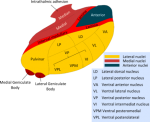frozenborderline
Senior Member
- Messages
- 4,405
I have severe hyperacusis. It may be one of my worst symptoms. In past few days it had gotten worse so I'm extra motivated to research it ... but have low energy.
Anyway in the past I connected my hyperacusis to brainstem , especially bc I have cci. And brainstem is known to control sensory input (naviaux says this) . And specifically I found one paper that said high glutamate in brainstem is responsible for sound sensitivity.
Makes sense bc gabaergics and nmda antagonists, along with traction to some extent, were what relieved hyperacusis.
Anyway to treat hyperacusis I'm not sure I can just ask a palliative care doctor bc the treatment depends on the cause, even to justnpalliate the symptoms. There arent across the board broad hyperacusis drugs like there are forpain, it's even more heterogeneous.
So I am desperately trying to pinpoint cause. It does seem like medical establishment agrees that brainstem could be involved, heres a quote
What causes hyperacusis ?
Anyway , later in that same article baclofen is listed as something that could help. Opioid agonists have also helped me some.
Anyway in the past I connected my hyperacusis to brainstem , especially bc I have cci. And brainstem is known to control sensory input (naviaux says this) . And specifically I found one paper that said high glutamate in brainstem is responsible for sound sensitivity.
Makes sense bc gabaergics and nmda antagonists, along with traction to some extent, were what relieved hyperacusis.
Anyway to treat hyperacusis I'm not sure I can just ask a palliative care doctor bc the treatment depends on the cause, even to justnpalliate the symptoms. There arent across the board broad hyperacusis drugs like there are forpain, it's even more heterogeneous.
So I am desperately trying to pinpoint cause. It does seem like medical establishment agrees that brainstem could be involved, heres a quote
What causes hyperacusis ?
- Inner ear -- e.g. Menieres's disease, Superior canal dehiscence
- 8th nerve -- e.g. microvascular compression, after surgery on the 8th nerve.
- Brainstem
- Brain -- migraine
- Psychological -- highly vigilant or obsessive people; Asperger's syndrome
Anyway , later in that same article baclofen is listed as something that could help. Opioid agonists have also helped me some.

